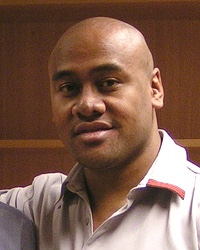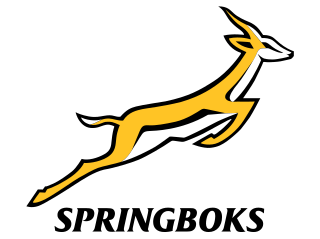
The New Zealand national rugby union team, commonly known as the All Blacks, represents New Zealand in men's international rugby union, which is considered the country's national sport. Famed for their international success, the All Blacks have often been regarded as one of the most successful sports teams in history.

Jonah Tali Lomu was a New Zealand professional rugby union player. He is widely regarded as one of the greatest and most influential players in the history of the sport, and as one of the most talented sportsmen ever. Lomu is considered to have been the first true global superstar of rugby, and consequently had a huge impact on the game.

Wellington College, is a state-run boys secondary school in Wellington, New Zealand. It is situated on 12 hectares of green belt land in the suburb of Mount Victoria, in the vicinity of the Basin Reserve and Government House. The school was founded in 1867 through a deed of endowment from Sir George Grey, the then Governor of New Zealand.

The South Africa national rugby union team, commonly known as the Springboks, is the country's national team governed by the South African Rugby Union. The Springboks play in green and gold jerseys with white shorts, and their emblem is the Springbok, a native antelope and the national animal of South Africa. The team has represented South African Rugby Union in international rugby union since 30 July 1891, when they played their first test match against a British Isles touring team. Currently, the Springboks are the reigning World Champions, having won the World Cup a record four times. South Africa have won half of the Rugby World Cups they have participated in and are also the second nation to win the World Cup consecutively.

The Australia men's national rugby union team, nicknamed the Wallabies, is the representative men's national team in the sport of rugby union for the nation of Australia. The team first played at Sydney in 1899, winning their first test match against the touring British Isles team.

The National Provincial Championship (NPC) is an annual round-robin rugby union competition in men's domestic New Zealand rugby. First played in 1976, it is the second highest level of competition in New Zealand alongside the Ranfurly Shield. It is organised by New Zealand Rugby (NZR) and since 2021, it has been known as the Bunnings NPC after Bunnings, its naming rights sponsor. A concurrent women's tournament is also held, the Farah Palmer Cup.

New Zealand Rugby (NZR) is the governing body of rugby union in New Zealand. It was founded in 1892 as the New Zealand Rugby Football Union (NZRFU), 12 years after the first provincial unions in New Zealand. In 1949 it became an affiliate to the International Rugby Football Board, now known as World Rugby, the governing body of rugby union for the world. It dropped the word "Football" from its name in 2006. The brand name New Zealand Rugby was adopted in 2013. Officially, it is an incorporated society with the name New Zealand Rugby Union Incorporated.

Sir John James Patrick Kirwan is a New Zealand mental health advocate, former rugby union and rugby league player, and former rugby union coach.

Hamilton Boys' High School is a boys' secondary school in Hamilton, New Zealand and is the largest secondary school in the Waikato region. The school was established as Hamilton High School in 1911 but was later split into separate boys' and girls' schools, with the current school opened in February 1955. Its sister school is Hamilton Girls' High School. The school crest features a lion, sash and star, and bears the motto "Sapiens Fortunam Fingit Sibi" which translates to "a wise man carves his own fortune". The school colours are black and red.

Christchurch Boys' High School, often referred to as CBHS, is a single sex state secondary school in Christchurch, New Zealand. It is situated on a 12-hectare (30-acre) site between the suburbs of Riccarton and Fendalton, 4 kilometres (2.5 mi) to the west of central Christchurch. The school also provides boarding facilities for 130 boys in a residence called Adams House located about 500 metres (1,600 ft) to the east. The school's colours are deep blue and black with an occasional flash of gold.
The following lists events that happened during 1990 in New Zealand.

Halt All Racist Tours (HART) was a protest group set up in New Zealand in 1969 to protest against rugby union tours to and from South Africa. Founding member Trevor Richards served as president for its first 10 years, with fellow founding member John Minto then serving as president until South Africa dismantled apartheid in the early 1990s.

Rugby union in Samoa is the country's most popular sport. The national teams in both the standard 15-man game and rugby sevens are consistently competitive against teams from vastly more populous nations.
Gavin Lyle Hill is a New Zealand former rugby union and rugby league footballer who played in the 1980s, 1990s and 2000s, and coached rugby union the 2000s. He resided in Wellington for 10-years before moving back to Auckland in 2008 to take a coaching position in the Air New Zealand Cup.
John Kahukura Raymond Timu is a New Zealand former rugby league and rugby union footballer who played in the 1980s and 1990s who achieved international selection for New Zealand in both rugby codes, appearing in 26 tests for the All Blacks in union and nine for the Kiwis in league. Timu's usual position was centre in league and in union he would play at full-back or on the wing.
The Cavaliers was an unofficial New Zealand rugby union team which toured South Africa in 1986. Because of the Apartheid policies of the South African government, the official New Zealand Rugby Union tour scheduled for 1985 was cancelled, and the Cavaliers tour was very controversial in New Zealand.

The first clash in Rugby Union between Australia and New Zealand took place in a test match on 15 August 1903 in Sydney, New South Wales. On that occasion, New Zealand won 22–3.
The 1960 New Zealand rugby union tour of South Africa, was a series of rugby union matches played by the New Zealand national rugby union team in South Africa and Rhodesia.

Rugby union and apartheid had a complex and supportive relationship. From 1948 to 1994, international rugby relations with the country, and also the non-integrated nature of rugby within South Africa drew frequent controversy. South Africa remained a member of the International Rugby Board (IRB) throughout the apartheid era.

In 1992, the South Africa Springboks played a rugby union test match against the New Zealand All Blacks, which later became known as the Return Test. The match was played at Ellis Park Stadium in Johannesburg on 15 August 1992. It was named as the Return Test as it was South Africa's first test match since the International Rugby Football Board (IRFB) had banned them due to apartheid.















